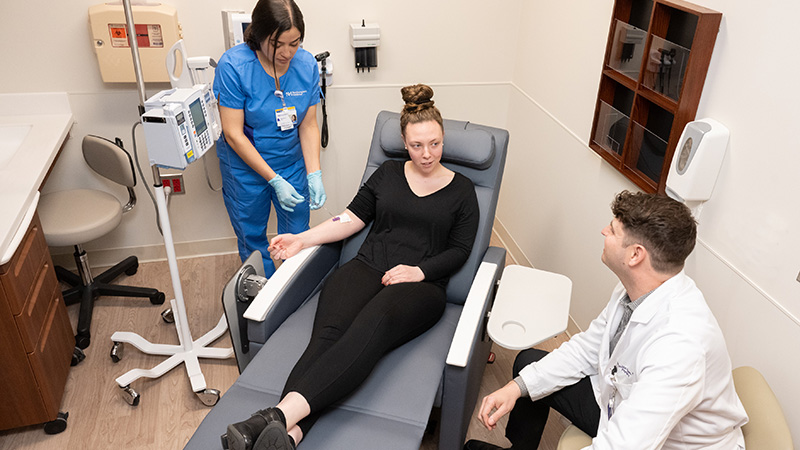How to Support Someone in Recovery
5 Ways to Help
Published April 2021
In the U.S., about 5.8% of adults ages 18 and older have an alcohol use disorder. Among people with this disorder, roughly 7.9% receive professional treatment from a rehabilitation facility specializing in alcohol abuse.
When seeking such treatment, "it's vital for individuals to develop a support system to reflect things off of," says Danesh A. Alam, MD, a psychiatrist who is board-certified in addiction medicine, and the medical director of Behavioral Health Services at Northwestern Medicine Central DuPage Hospital.
Triggers and signs will be different for each patient.— Danesh A. Alam, MD
Dr. Alam offers suggestions to help support the people in your life who are in recovery.
- Acknowledge triggers.
People in recovery from addiction are working to separate themselves from the people, places and things of their past that contributed to their addictive behavior. Certain traditions and hobbies can be challenging if they bring back memories of positive or negative times involving addictive behaviors.
According to Dr. Alam, many individuals regress to former, unhealthy behaviors when returning to their parents' home, for example, where they risk being sidetracked from their usual regimens and exposed to certain triggers. "While triggers and signs will be different for each patient, the most important signal is an individual's state of mind," states Dr. Alam.
Do your best to be in touch with what your loved one is going through, and listen with empathy if they need to talk about tempting thoughts.
- Respect boundaries.
"What we try to do is to teach patients in recovery how to give their family members and friends permission to hold them accountable. We also work with family members to respect someone's boundaries around abstinence," states Dr. Alam.
As with any critical illness, there will be ups and downs. You can help your loved one be prepared for the temptations. If your loved one asks you to provide accountability, consider writing down vulnerabilities and isolate factors that reduce risk for relapse. For example, if your loved one has a history of alcohol misuse, they should avoid using food delivery services from places that also sell alcohol.
If your loved one does not ask you for help, you can still have an honest, private conversation to learn how you can best respect personal boundaries and offer your support. You can ask questions like:- Is there anything I can do to support you?
- Is talking about this helpful to you?
- Does it make you uncomfortable when people use alcohol in front of you?
- Avoid judgment.
Aim to be supportive without being judgmental or overwhelming your loved one. Pay attention to your tone, voice inflection and moments of silence while communicating about their disorder. Ask your loved one to hold you accountable if you do anything to make them feel judged or uncomfortable.
During their recovery from alcohol misuse, do not talk to your loved one about the consequences of their actions. A critical or controlling parent, for example, may think they are being helpful by emphasizing the health consequences of alcohol misuse, but this approach might make the situation worse. If you see that your loved one has made a risky decision, ask how you can help rather than highlight negative outcomes, like possible relapse.
- Plan activities that don't involve food or drink.
In a culture where alcohol is the focal point of many gatherings, people with alcohol use disorder face inevitable temptation. The constant reminder or emphasis placed on food and alcoholic drinks can take a toll on their mental health.
Another major challenge in recovery is navigating large blocks of free time when there may be no accountability. Invite your loved one to join you in activities not centered on drinking. - Check in around the holidays.
Keep in close touch with your loved one around the holidays. The holiday season is often filled with highs and lows. Financial obligations, loneliness, family conflict and the rush of holiday shopping can amplify stress, anxiety and depression. All of these factors can serve as triggers for people who are in recovery from an alcohol use disorder. "The holiday season itself increases the risk of substance abuse and mental illness," notes Dr. Alam.
Dr. Alam also says there often is an uptick in the use of addiction services in January and February. "It's actually the post-holiday blues that are much more relevant, because people dealing with addiction are often integrating back into their routine alone," he explains. "They may experience feelings of isolation compiled with the emptiness of the holidays being over."






